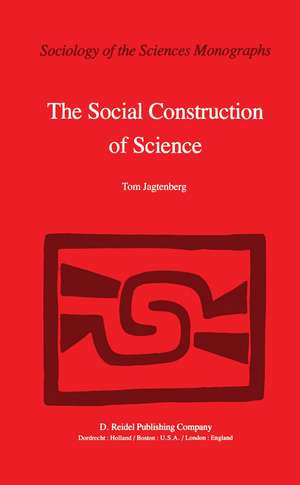The Social Construction of Science: A Comparative Study of Goal Direction, Research Evolution and Legitimation: Sociology of the Sciences - Monographs, cartea 2
Autor T. Jagtenbergen Limba Engleză Hardback – 30 apr 1983
| Toate formatele și edițiile | Preț | Express |
|---|---|---|
| Paperback (1) | 942.76 lei 6-8 săpt. | |
| SPRINGER NETHERLANDS – 12 oct 2011 | 942.76 lei 6-8 săpt. | |
| Hardback (1) | 949.73 lei 6-8 săpt. | |
| SPRINGER NETHERLANDS – 30 apr 1983 | 949.73 lei 6-8 săpt. |
Preț: 949.73 lei
Preț vechi: 1158.20 lei
-18% Nou
Puncte Express: 1425
Preț estimativ în valută:
181.73€ • 198.02$ • 153.13£
181.73€ • 198.02$ • 153.13£
Carte tipărită la comandă
Livrare economică 23 aprilie-07 mai
Preluare comenzi: 021 569.72.76
Specificații
ISBN-13: 9789027714985
ISBN-10: 9027714983
Pagini: 260
Ilustrații: XVIII, 237 p.
Dimensiuni: 210 x 297 x 20 mm
Greutate: 0.57 kg
Ediția:1983
Editura: SPRINGER NETHERLANDS
Colecția Springer
Seria Sociology of the Sciences - Monographs
Locul publicării:Dordrecht, Netherlands
ISBN-10: 9027714983
Pagini: 260
Ilustrații: XVIII, 237 p.
Dimensiuni: 210 x 297 x 20 mm
Greutate: 0.57 kg
Ediția:1983
Editura: SPRINGER NETHERLANDS
Colecția Springer
Seria Sociology of the Sciences - Monographs
Locul publicării:Dordrecht, Netherlands
Public țintă
ResearchCuprins
1. The Social Construction of Science.- 1.1. Introduction.- 1.2. The Theoretical Perspective Developed in this Book.- 2. What is Science?.- 2.1. The Need for Precise Definitions.- 2.2. Structure and Meaning in the Analysis of Science.- 2.3. Science and Its Sub-Universes of Meaning.- 2.4. Science as a System of Theoretical Production.- 2.5. Social Control in Science.- 2.6. Research.- 2.7. Types of Research: Basic Research vs. Practice Oriented Research.- 2.8. The Negotiation of Meaning in Science.- 2.9. Summary.- 3. Science and Professionalism.- 3.1. Introduction.- 3.2. Science and Professionalism.- 3.3. The Role of Autonomy in Science.- 3.4. Scientific Autonomy and Politics.- 3.5. The Inertia of Contemporary Science.- 3.6. The Professional Orientational Reference Group.- 3.7. The Context of Legitimation vs. the Context of Research.- 3.8. Professionalism and the Articulation of Beliefs in an Era of Resource Scarcity.- 4. Scientists Have Goals.- 4.1. Introduction.- 4.2. The ‘Common-Sense’ Notion of Goals in Scientific Research.- 4.3. The Institutional Context of Goal Direction in the Physical Sciences.- 4.4. The Political Receptivity of Scientific Fields.- 4.5. What is a Goal?.- 4.6. What Are the Goals of Science? An Australian Case Study.- 5. Cognitive and Social Dimensions in the Analysis of Science.- 5.1. Introduction.- 5.2. Cognitive and Social Institutionalisation.- 5.3. The Cognitive Field of a Scientist.- 5.4. Cognitive Structures in the Context of Research.- 5.5. Operationalising Social and Cognitive Concepts.- 5.6. Some Methodological Observations About My Own Research.- 6. Research and Its Legitimation: Two Cognitively Oriented Case Studies.- 6.1. Introduction.- 6.2. Some Methodological Details.- 6.3. Case Study 1: The Selective Surfaces Research Group(SSG).- 6.4. Case Study 2: The Dopamine/Octopamine Research Group (DOG).- 6.5. Comparing the Two Case Studies.- 7. General Conclusions.- 7.1. Suggestions for Future Work.- Notes.- Index of Names.- Index of Subjects.
Recenzii
`The book breaks with established tradition in the history, philosophy and sociology of science by attempting to portray in one unified analysis, both the cognitive and social dimensions of the institutionalisation of the physical sciences. The analysis is therefore unique in its breadth of focus and shows how the traditional concerns of sociologists with generalised macrostructures of meaning and action can be related to the life worlds of individual scientists.'
Scientia, 120 (April 1985)
Scientia, 120 (April 1985)













